

A Syrian militant alliance led by the Hayat Tahrir al-Sham group toppled former president Bashar al-Assad's government on Dec 8, 2024.
Shortly after the collapse of Bashar al-Assad's government, leaders of the Hayat Tahrir al-Sham formed an interim government.

ANKARA - Syria's interim Foreign Minister Asaad Al-Shaibani met with Turkish President Recep Tayyip Erdogan and Foreign Minister Hakan Fidan on Wednesday on his first official visit to Turkiye.
The meeting between Erdogan and Al-Shaibani addressed the most recent situation in Syria and steps to be taken to preserve the country's territorial integrity, Turkiye's Communications Directorate said in a statement on the social media platform X.
According to the directorate, Erdogan said that "Turkiye will support meeting the urgent needs of the brotherly Syrian people and the efforts to rebuild the country," emphasizing the importance of lifting international sanctions on Syria.
Erdogan also underscored that there is no room for terrorist organizations in Syria's future, the statement added.
In a joint press conference following the meeting with Al-Shaibani, Fidan said "the international community could support Syria to rebuild state institutions and build capacity," calling for the removal of sanctions "to facilitate the provision of basic public services and accelerate normalization".
"This will create conditions enabling millions of Syrians to return home," the Turkish minister said.
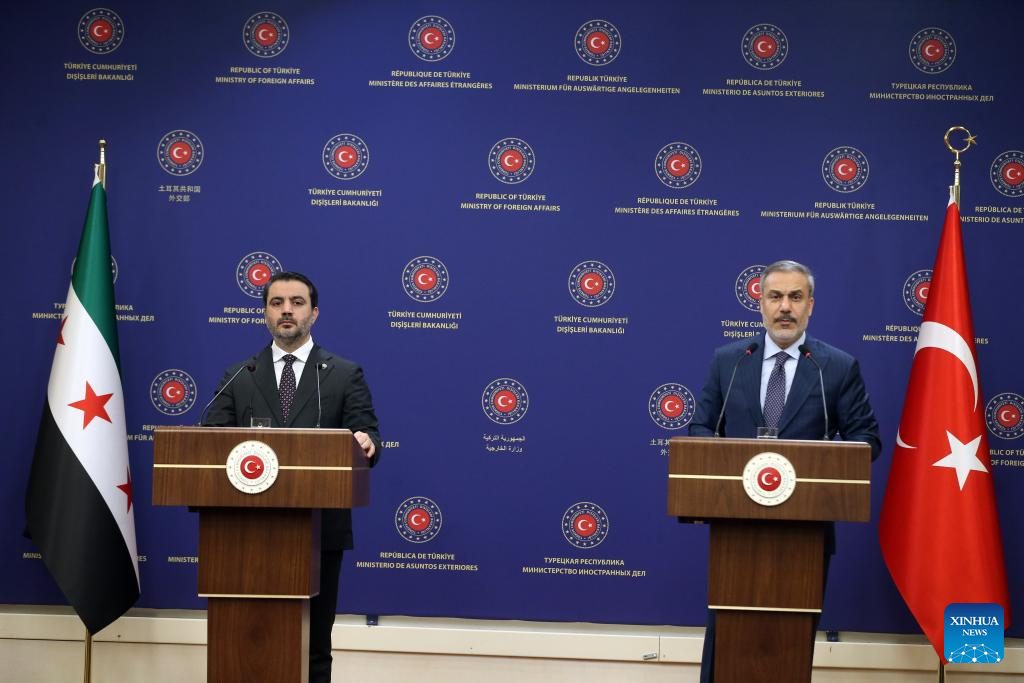
Fidan also reaffirmed Ankara's commitment to aiding the fight against terrorism, including operational support against the Islamic State (IS), emphasizing that regional cooperation is vital.
"We have already taken steps to assist and are prepared to help manage camps and prisons housing IS detainees," he added.
He also reiterated Turkiye's stance against the fragmentation of Syria. "We will never consent to the division of Syria. There is no place for terror in the region's future."
The Turkish minister also announced that Turkiye's consulate in Aleppo would reopen on Jan 20.
Al-Shaibani, for his part, described the visit as a turning point for Turkish-Syrian relations, saying "Turkiye and Syria are writing a new history based on brotherhood."
He underscored the importance of maintaining Syria's territorial integrity and the central government's control over all areas. "We believe Syria's northeastern regions must not pose a threat to Turkiye and should be unified under our central governance," Al-Shaibani said.
Calling on the international community and neighboring countries for support, Al-Shaibani said, "Syria urgently needs assistance for its reconstruction and the establishment of educational institutions. With brotherly cooperation, we can restore dignity and normalcy to the Syrian people."
Turkiye has voiced its commitment to Syria's post-conflict reconstruction, with Turkish officials signaling their willingness to provide logistical support, technical expertise, and investment in key sectors such as construction, agriculture, and energy.
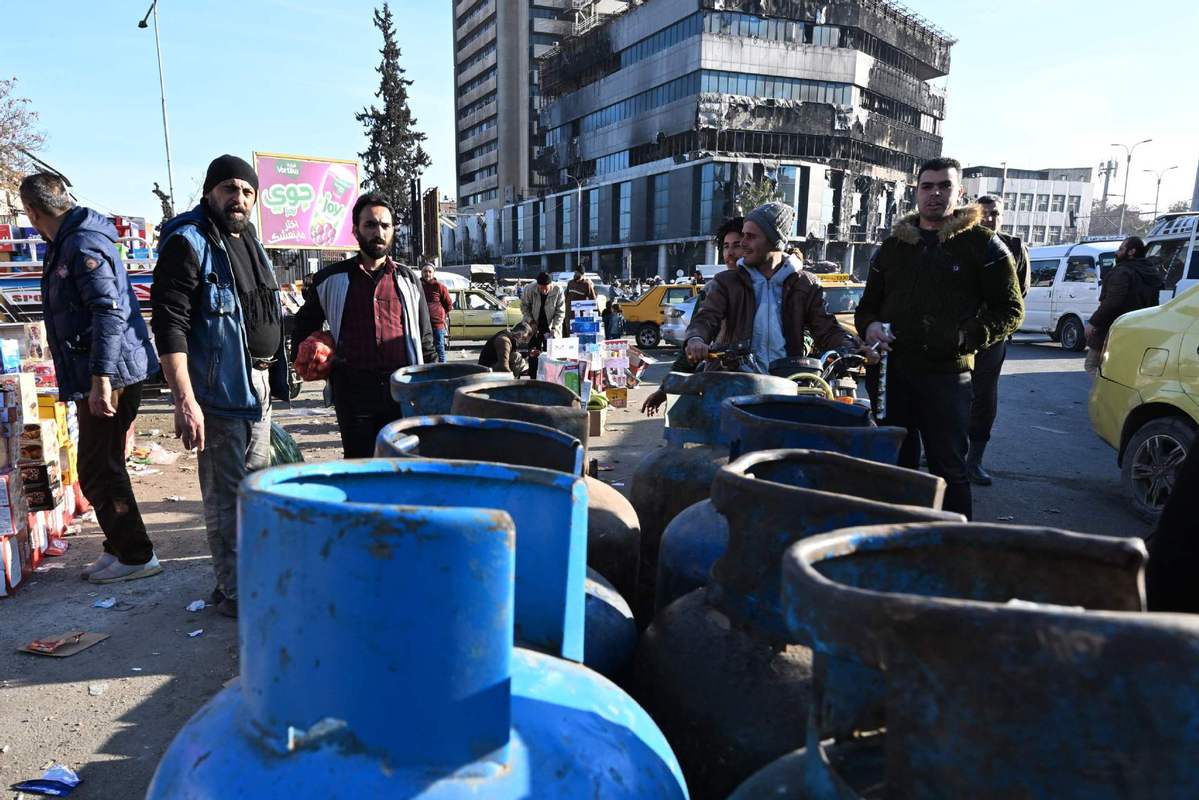
ANKARA — Turkiye's business community, in collaboration with government institutions, has launched initiatives to aid Syria's recovery, focusing on rebuilding the war-torn country's devastated economic structure.
Earlier last week, government officials and business leaders convened in the Turkish capital Ankara to discuss actionable plans for Syria's reconstruction and economic development.
"We aim to reestablish trade routes with Syria and empower Syrian businesses to realize their potential," said Mustafa Uyar, a businessman from Gaziantep, a city near the border with Syria.
Gaziantep, home to hundreds of thousands of Syrian refugees, has been a historical gateway for commerce between the two nations. "We've already initiated contact with Syrian counterparts and have begun limited exports," Uyar told Xinhua News Agency.
Recent trade figures reflected this renewed momentum. According to data from the Turkiye Exporters Assembly, Turkish exports to Syria grew by nearly 20 percent year-on-year in December, surpassing $150 million. This brought Turkiye's total export volume to Syria for 2024 to over $1.5 billion.
Syria has been grappling with severe economic and infrastructural challenges after over 13 years of civil war. Following the fall of former Syrian president Bashar al-Assad's government on Dec 8, Ankara has voiced its support for Syria's new leadership, with the reopening of the Turkish embassy in Damascus and high-level visits to the Syrian capital in the past weeks.
Multiple Turkish ministries have also unveiled plans to help repair roads, airports, and energy and electricity infrastructure in Syria.
Bilgehan Engin, head of the Association of International Transport and Logistics Service Providers, identified Syria as a market with significant untapped trade potential.
"The cessation of Syria's civil conflict presents significant opportunities for Turkish industries, particularly in the logistics and infrastructure sectors," Engin told Xinhua.
Ibrahim Fuat Ozcorekci, chairman of the Turkiye-Syria Business Council at the Foreign Economic Relations Board, highlighted the enthusiasm of Turkish businesses to invest in Syria.
"My phone hasn't stopped ringing. Everyone wants to know when and how to begin operations in Syria," he told local Hurriyet Daily News last week.
Syrian entrepreneurs operating in Turkiye also played a crucial role in boosting the revival of bilateral trade, experts underscored.
"There are approximately 35,000 Syrian-owned or partnered companies in Turkiye," noted Guven Sak, a researcher at the Ankara-based Economic Policy Research Foundation of Turkiye, in a recent article.
"These businesses are uniquely positioned to bridge trade between the two countries, given their knowledge and experience," Sak added.
Xinhua
KUWAIT CITY - Kuwait dispatched another aid plane to Syria on Monday, carrying 33 tonnes of relief and medical supplies to assist Syria's "most vulnerable populations," state news agency KUNA reported.
The plane departed from Abdullah al-Mubarak Air Base in Kuwait City and landed at Damascus International Airport, where it was received by Syrian officials, according to the report. The shipment was coordinated by Kuwait's Health Ministry and the Kuwait Red Crescent Society.
This marks Kuwait's second aid delivery to Syria since the swift fall of former President Bashar al-Assad's government in December 2024. The first shipment, sent on Dec 30, included 20 tonnes of food, tents, and blankets to address urgent humanitarian needs in the war-torn country.
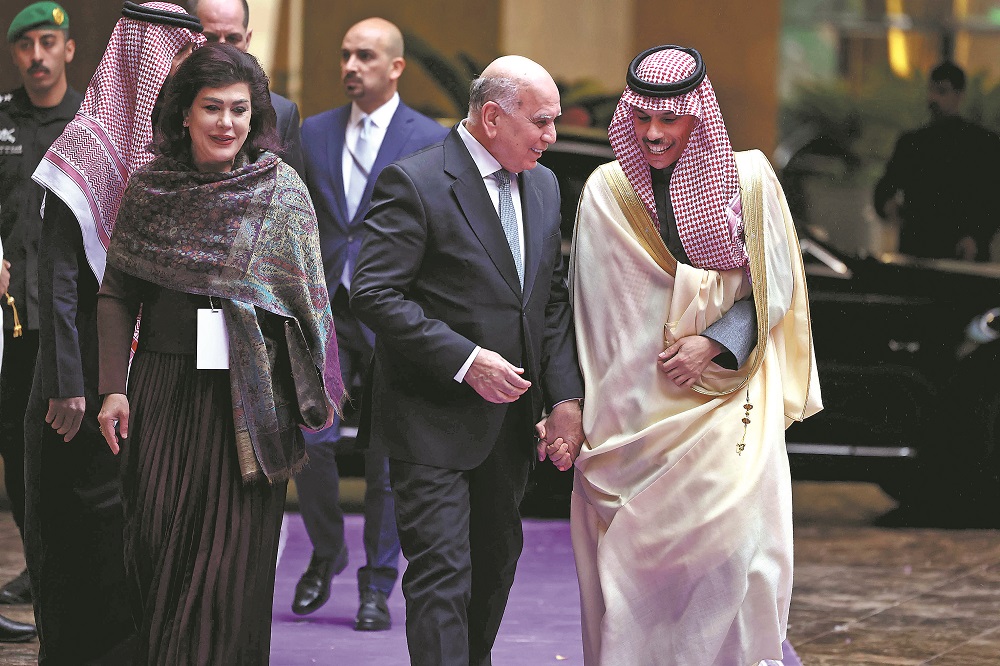
The Arab world and several Western countries jointly called for the lifting of sanctions on Syria at a meeting in Riyadh on Sunday, marking a coordinated effort to support the war-torn country.
The meeting, led by Saudi Arabia, was the first to include Syrian interim government officials and top Western diplomats. It followed the fall of Syria's previous government and centered on steps to support the Syrian people in rebuilding a unified, independent and secure state, the Saudi Press Agency reported.
"We stressed the importance of lifting unilateral and international sanctions imposed on Syria, as their continuation hinders the aspirations of the Syrian people to achieve development and reconstruction," said Saudi Foreign Minister Faisal bin Farhan Al Saud.
A communique released by the Saudi Foreign Ministry reiterated calls to remove sanctions and expressed concern over Israel's incursions into the occupied Golan Heights.
Syria's interim Foreign Minister Asaad al-Shaibani, who has repeatedly called for lifting long-standing sanctions, attended the talks alongside foreign ministers and representatives from Bahrain, Egypt, Turkiye, the United Arab Emirates, Germany, Italy, the United Kingdom, the United States, and other countries.
UAE Deputy Prime Minister and Foreign Minister Abdullah bin Zayed Al Nahyan said the meeting reflected the significance of collective regional and international efforts to support the Syrian people at all levels, the Emirates News Agency reported.
Gokhan Ereli, a Gulf studies coordinator at the Center for Middle Eastern Studies in Turkiye, told China Daily that the meeting showed Saudi Arabia's intent to lead efforts to reintegrate Syria into the Arab world.
"By advocating for reconstruction, humanitarian aid and sanctions relief, the kingdom is not only positioning itself as a key regional player but also working to resolve one of the Middle East's most complex crises in a way that aligns with its vision for stability and security," he said.
Hussein Maklad, a professor of international relations at Damascus University, said the sanctions have negatively affected the Syrian people and lifting such curbs will go to the benefit of all Syrian people.
The US, the UK, the European Union and others have imposed harsh sanctions on Syria since the Syrian civil war broke out in 2011.
Last week, the US issued a six-month exemption from its sanctions to facilitate humanitarian aid and allow some energy-related transactions with Syrian governing bodies.
In a statement published by the Saudi Foreign Ministry, Faisal welcomed Washington's decision, urging all forms of support for Syria, which "will create the appropriate environment for the return of Syrian refugees".
France, Germany and Italy have recently pushed for the relaxation of EU sanctions on Syria, but a final decision could only come from the entire bloc.
Kaja Kallas, the EU's foreign policy chief, said during the Riyadh meeting that European foreign ministers would convene in Brussels on Jan 27 to discuss how the bloc would ease sanctions on Syria.
However, any decision would be contingent on the new Syrian administration's approach to governing, which must include representation from "different groups" and women and "no radicalization", Kallas said, without elaborating.
Meanwhile, experts highlighted the urgency for reconstruction in Syria.
"If you are giving the licenses for six months, there will be no construction or reconstruction either in the health sector or in the cities that are ruined to the ground because of the bombardment of the planes. Syrian reconstruction needs years," said Rasha Al Joundy, a senior researcher at the Dubai Public Policy Research Centre.
Galip Dalay, a senior consulting fellow at Chatham House in London, told Al Jazeera that until the new Syrian government delivers on points emphasized by the West, "any assistance will be quite limited", mostly confined to the humanitarian aspect.
"What Syria needs is much beyond that and consists of massive reconstruction. So far, we don't see the Western actors showing full commitment before they see some steps in Syria," he said.
Agencies contributed to this story.
37 killed in Syria clashes between pro-Turkiye, Kurdish forces -- media
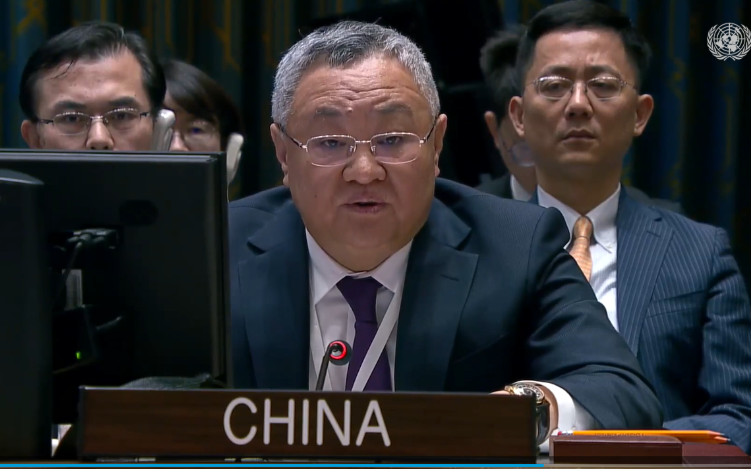
China's top ambassador to the United Nations on Wednesday stressed that China is "greatly concerned" over the Syrian Army "granting senior ranks to foreign terrorist fighters", including the leader of the Turkistan Islamic Party, also known as the East Turkestan Islamic Movement (ETIM).
China calls on Syria to "fulfill its counter-terrorism obligations and to prevent any terrorist forces from using the Syrian territory to threaten the security of other countries," said Fu Cong, China's permanent representative to the UN. The ETIM was designated by China and listed by the UN Security Council as a terrorist organization.
"No matter how the domestic situation in Syria develops, the bottom line of zero tolerance for terrorism cannot be changed," Fu said, noting that the council recently issued a statement on Syria, making it clear that states should combat all terrorist organizations listed by the council and deny safe haven for terrorists.
He said China supports a Syrian-led and Syrian-owned political process in accordance with the spirit and principles of Council Resolution 2254, a resolution adopted unanimously in 2015 that endorsed such a political transition to end the conflict.
The resolution also reiterates the call for member states to prevent and suppress terrorist acts carried out by individuals, groups, undertakings and entities associated with terrorist organizations designated by the Security Council.
The international community should "respect Syria's right to pursue a development path in line with its national conditions, and allow the Syrian people to decide their country's future based on their will", said Fu.
Fu pointed out that Syria has "one of the worst humanitarian situations, with more than 16 million people in dire humanitarian straits, and the prolonged illegal unilateral sanctions have further aggravated the suffering of the Syrian people".
He called on the international community to increase its assistance to Syria. He said the UN should play a coordinating role, speeding up the implementation of humanitarian projects and prioritizing the needs of the population to survive the winter.
"All parties in Syria should abide by international humanitarian law, cooperate actively with humanitarian operations, and ensure humanitarian access and the safety of humanitarian personnel," said Fu.
Fu further said that the Golan Heights is internationally recognized as occupied Syrian territory. Resolution 497 (1981) adopted by the council determines the legal status of the Golan Heights and "makes it clear that the Israeli occupation of the Syrian Golan Heights is null and void".
China reiterates that the sovereignty, independence, unity and territorial integrity of Syria should be respected, that the council resolutions on the Golan Heights must be implemented, and that the 1974 agreement on disengagement of forces should be complied with, Fu said.
He said that China has "long pursued a policy of friendship and cooperation with Syria, and has never interfered in its internal affairs", he said.
"We stand ready to continue working with the international community for Syria to have a smooth transition and gradually embark on a path of peaceful development," said Fu.
minluzhang@chinadailyusa.com
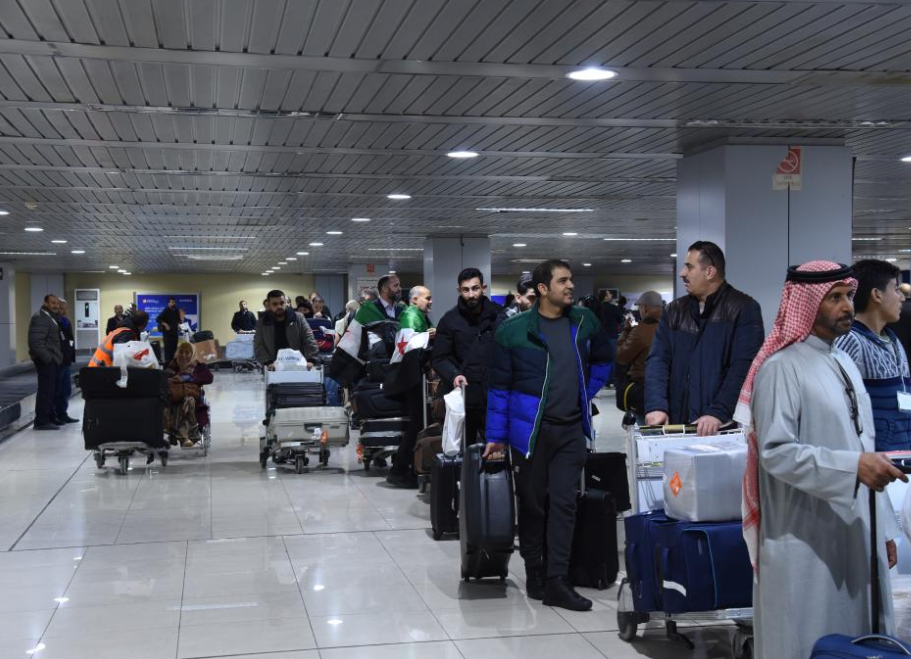
UNITED NATIONS - The United Nations is ready to work with the Syrian interim government on advancing towards a credible and inclusive political transition, a UN special envoy said on Wednesday.
"Today, Syria seeks to chart a new course following the fall of the former regime just one month ago. Decisions taken now will determine the future for a long time to come. There are great opportunities and real dangers," Geir Pedersen, UN special envoy for Syria, told the UN Security Council via video from Geneva.
"Syrians and the international community need to get the next phase right, and the UN stands ready to do everything we can to facilitate, to help and to support," he said.
Briefing the first Security Council meeting of the year on Syria, Pedersen said that the caretaker authorities continue to work to structure and consolidate their authority. They have held meetings with a very broad range of representatives and individuals of different Syrian groups and components, and met with visiting foreign ministers and officials.
However, he pointed out that there are signs of instability within areas under the control of the interim government, including reports of violence in the coastal region and Homs and Hama, and plans for public sector restructuring which may leave many without livelihoods.
Meanwhile, in the large areas outside the control of the authorities, the conflict continues, Pedersen said.
The special envoy called for and voiced his support for the further development of all channels of dialogue, and urged all parties to find a way forward without military confrontation.
Noting there are "very real threats" to Syria's sovereignty and territorial integrity, Pedersen listed Israeli military airstrikes and the terror group Islamic State.
Pedersen said he is "deeply concerned" by continued Israeli military presence and activity, including beyond the area of separation in violation of the 1974 Disengagement Agreement. Reports of Israeli forces using live ammunition against civilians, displacement and destruction of civilian infrastructure are also "very worrying".
"Such violations, along with Israeli airstrikes in other parts of Syria -- reported even last week in Aleppo -- could further jeopardize the prospects for an orderly political transition," the special envoy underscored, urging Israel to stop attack on Syria.
The United States on Monday issued sanction exemptions and waivers for transactions with Syrian governing institutions for six months in an effort to ease the flow of humanitarian assistance and allow some energy transactions, which was welcomed by Syria's interim Foreign Ministry.
Pedersen welcomed the move from the White House, adding "much more significant work in fully addressing sanctions and designations will inevitably be necessary".
"The way forward on political transition is unclear. There are positive elements to build on, but also points of concern that Syrians are expressing," he told the council.
"There are tremendous opportunities for building a foundation for lasting peace and stability in Syria. But missteps or missed opportunities could pose risks to Syria's future and plant seeds of instability," Pedersen said.
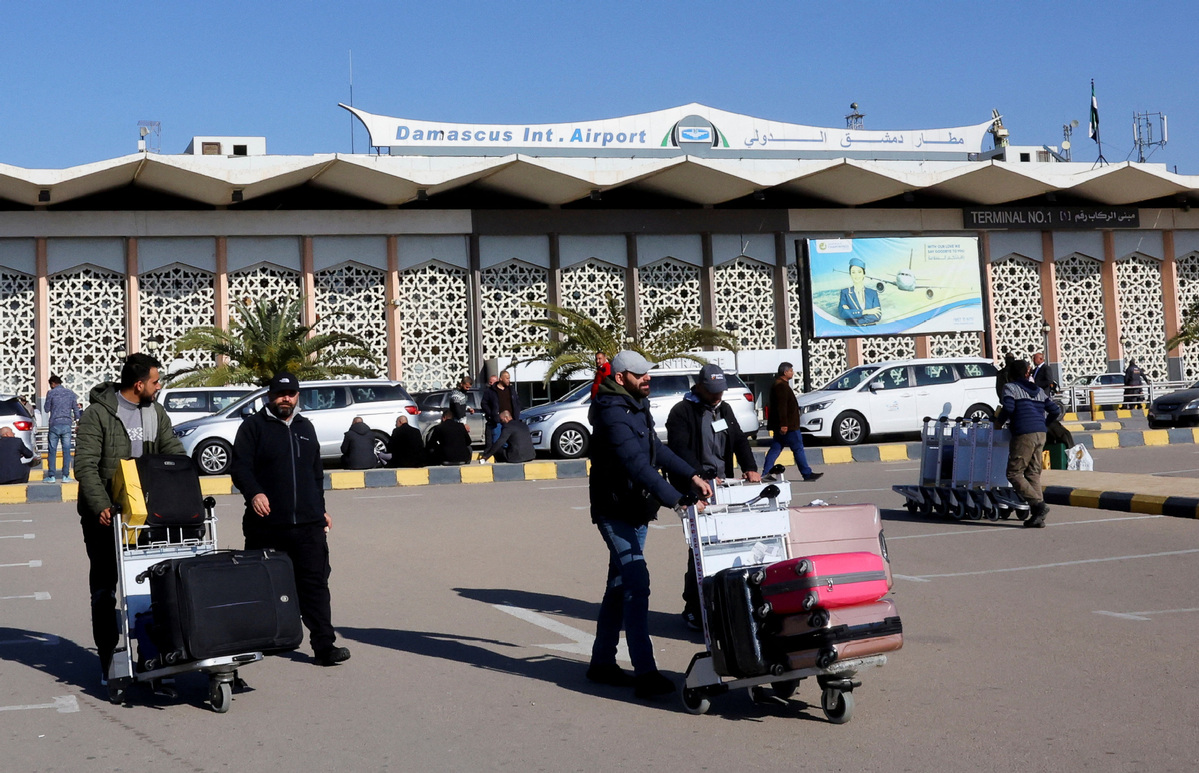
DAMASCUS - A series of moves took place across Syria on Tuesday, as the new authorities seek to restore normalcy and tackle longstanding infrastructure challenges after the previous government's downfall in December 2024.
Damascus International Airport resumed international flights to and from Gulf nations, launching a morning departure to Sharjah in the United Arab Emirates and welcoming the first civilian flight from Qatar's Doha in 13 years.
It marks a step toward alleviating the burdens Syrians have faced traveling through alternate airports.
"We are now able to reactivate Damascus International Airport," said Ashhad Slaibi, head of Syria's civil aviation authority. "This development will help our citizens avoid higher travel costs and, in the near future, we hope to restore service at Aleppo Airport as well."
In a separate announcement on Tuesday, the General Organization for Electricity Transmission and Distribution said two power-generating vessels from Turkiye and Qatar are en route to Syria, capable of producing a combined 800 megawatts. It did not say over what period.
Director-General Khaled Abu Dei said this capacity is roughly half of Syria's current total electricity output, predicting a potential 50-percent boost in supply once the lines are set up to distribute the power.
Noting the extensive damage to power stations, substations, and transmission lines across Syria, Abu Dei said the new administration is working swiftly to rebuild and adapt the grid.
Meanwhile, Oil and Mineral Resources Minister in the Syrian interim government Ghaiath Diab said Tuesday that engineers are using the downtime of Syria's largest oil refinery the Baniyas Refinery, caused by a crude oil shortage since December 2024 after the fall of the previous Syrian government, to perform maintenance on equipment. Diab expected crude shipments to arrive soon, at which point the facility can restart production and help meet the nation's fuel needs.
In a statement to the local press on Tuesday, Syrian Arab Red Crescent chief Hazem Baqleh warned of severe medicine shortages and stressed the urgency of restoring hospital services, many of which were damaged during the conflict.
On the security front, an unnamed Syrian official was cited by the local Al-Watan Online newspaper as stating that security authorities on Tuesday launched a sweeping operation in Zabadani, west of Damascus, targeting leftover weapons depots and arresting "remnants" of the previous government's militias who refused to surrender arms or comply with reconciliation measures.
The operation followed a three-day security sweep launched by the military in the central Syrian province of Homs.
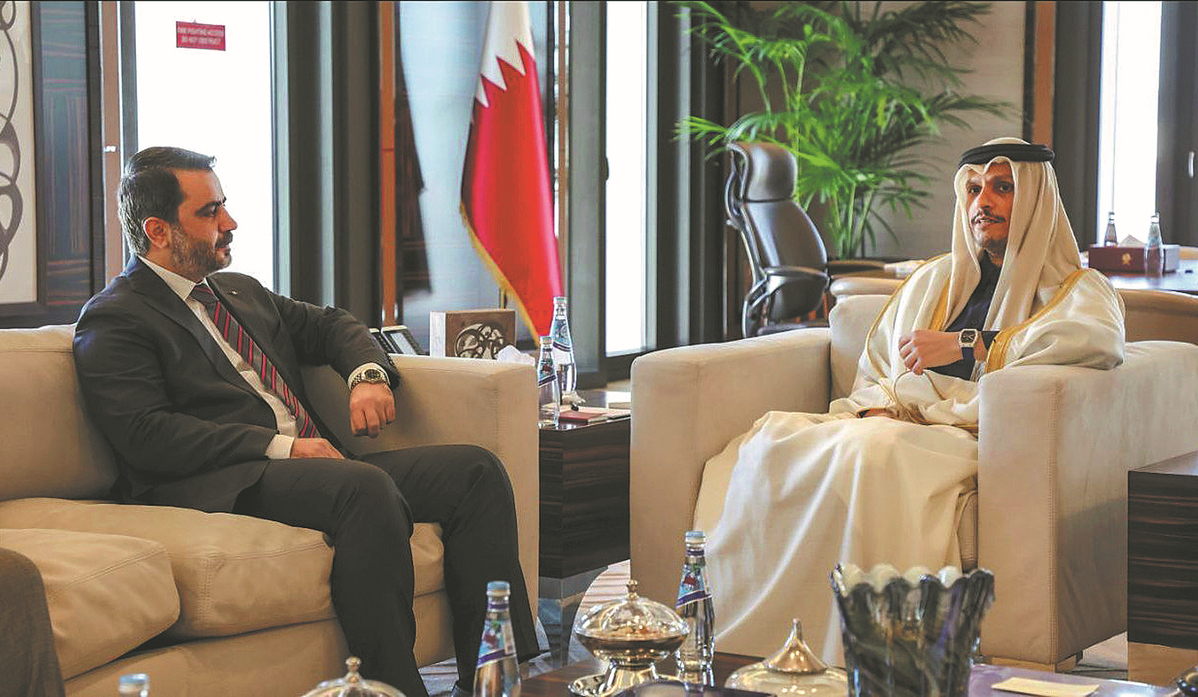
DOHA/DAMASCUS — Syria's interim Foreign Minister Asaad al-Shaibani reaffirmed his country's commitment to fostering positive foreign relations across the region during talks in Doha on Sunday.
In a series of posts on X, Shaibani said Syria's new administration will adopt foreign policies that differ markedly from those implemented by the previous government.
The remarks followed discussions with Qatar's Prime Minister and Foreign Minister Sheikh Mohammed bin Abdulrahman bin Jassim Al Thani, as well as Minister of State at the Foreign Ministry Mohammed bin Abdulaziz bin Saleh Al Khulaifi. Shaibani described the talks as "thorough and extensive".
During the meeting, key strategic issues were discussed and a road map for rebuilding Syria and empowering citizens was presented, Shaibani said. "We seek to form a Syrian government representing all segments of society."
He praised Qatar's "prominent role" in supporting Syrians amid the recent unrest and in the current stage of Syria's reconstruction, describing Qatar as a "strategic partner".
Shaibani also highlighted Damascus' desire to "mend ties with the Arab and international community", setting aside what he called the "old regime's approach", and stressed that Syria aims for "peaceful and cooperative relations that foster principles of justice, freedom and equality" for every citizen.
The minister also urged the United States to lift sanctions on the Syrian people, which he said primarily slow the pace of building a "new Syria".
The US is set to announce an easing of restrictions on providing humanitarian aid and other basic services such as electricity to Syria while maintaining its strict sanctions regime, people briefed on the matter told Reuters.
On Monday, Shaibani landed in the United Arab Emirates, official news agency SANA reported.
"Shaibani, accompanied by Defense Minister Murhaf Abu Qasra and Intelligence Chief Anas Khattab, has arrived in the United Arab Emirates," SANA said.
Shaibani also posted on X a picture of himself stepping off a plane, and said he looked forward "to building constructive bilateral relations".
Xinhua - Agencies
DAMASCUS -- Syria's Damascus International Airport will begin receiving international flights starting Tuesday, Ashhad al-Salibi, chairman of the Syrian General Authority of Civil Aviation and Air Transport, announced Saturday.
Al-Salibi told Syria's SANA state news agency that the authorities are in the process of fully rehabilitating the airports in Damascus and the northern city of Aleppo to accommodate international flights.
Operations at the airports were suspended following the overthrow of Syria's Bashar al-Assad administration last month.
Qatar Airways said on Thursday it will resume flights to Damascus as of Tuesday.

DAMASCUS - French and German foreign ministers urged Syria's new interim government on Friday to embrace diversity and inclusivity during a visit to Damascus, marking the first such European diplomatic mission since President Bashar al-Assad's fall from power in December.
French Foreign Minister Jean-Noel Barrot and German Foreign Minister Annalena Baerbock met with the de facto leader of Syria, Ahmed al-Sharaa, who leads the coalition that ousted Assad and now controls the Syrian capital.
"France and Germany stand with the Syrian people in all their diversity," Barrot said on X, formerly known as Twitter, calling for a "peaceful transition" to ensure regional stability.
After meeting civil society representatives, Barrot stressed the importance of Kurdish participation in the emerging political process.
Baerbock ruled out European Union funding for "new Islamist entities" while emphasizing minority rights and women's participation in the political process.
"A better future for Syria requires inclusive peaceful transfer of power," Baerbock told a news conference. "All ethnic and religious groups must participate in the constitutional process."
She cited security coordination between Kurdish forces and other factions as "an important first step" toward establishing a national defense framework.
A military coalition led by Hayat Tahrir al-Sham, under al-Sharaa's leadership, launched a major offensive from northern Syria on Nov. 27, capturing Damascus and overthrowing the government within 12 days.
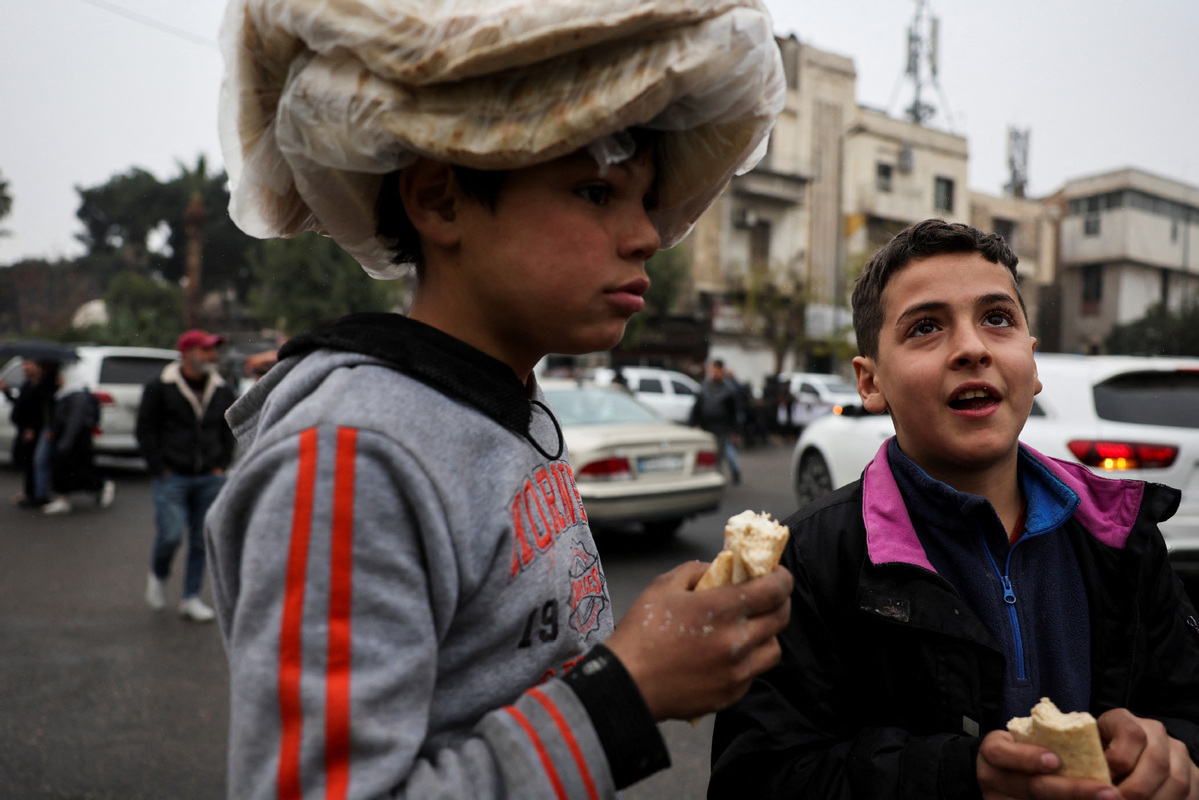
The Gulf Cooperation Council supports Syria's interim administration in maintaining unity and stability with the aim of bringing development and prosperity to the Syrian people, Jasem Mohamed Albudaiwi, secretary-general of the GCC, said during high-level talks with the country's interim rulers.
Albudaiwi, along with Kuwaiti Foreign Minister Abdullah Al-Yahya, led a delegation of GCC officials for a meeting on Monday with Syria's interim administration officials, including the de facto leader Ahmed al-Sharaa, in the Syrian capital Damascus, media reports said.
The GCC "welcomes the UN's call to establish a special mission to support the political transition process in accordance with the principles of the UN Charter to help the Syrian people achieve a Syrian-led political process", the GCC chief said during the meeting, Arab News reported.
Albudaiwi said the Gulf countries have always stressed the need to respect Syria's sovereignty, independence and territorial integrity, reject foreign interventions, and combat terrorism and extremism while respecting religious and cultural diversity in the country.
He condemned repeated Israeli attacks on Syrian territory, calling on Israel to withdraw its forces from occupied Syrian lands.
Rasha Al Joundy, a senior researcher at the Dubai Public Policy Research Centre, told China Daily that Syria cannot navigate these sensitive times without the support of its Arab and Gulf neighbors.
Qatar and Kuwait have already begun sending humanitarian aid and are exploring solutions to address the severe power shortages in Syria.
The high-level communication with Saudi Arabia and the wider GCC indicates that Syria's new transitional leadership has garnered Arab legitimacy and approval, which is crucial, alongside the potential lifting of US sanctions.
It seems everyone wants to give Syria all the tools it needs to overcome this critical period, Al Joundy said.
Electoral timetable
Al-Sharaa has said that holding elections in the country could take up to four years. It is the first time the new Syrian leader has commented on a possible electoral timetable since the fall of president Bashar al-Assad weeks ago.
By outlining a four-year timeline until elections, al-Sharaa will face challenges from civil society in Syria, Al Joundy said.
However, the new government formed after a national conference will ultimately have the final say on the election, rather than al-Sharaa alone, even if he is elected president during the conference, she said.
According to reports on Monday, the Syrian national conference is to take place in Damascus on Jan 4 and 5 to discuss the country's future. The conference is expected to establish a constitutional drafting committee and propose the formation of a new government within a month.
Meanwhile, a convoy of 60 trucks from the US-led coalition entered northeastern Syria on Monday, carrying weapons and logistics supplies to support the allied forces, Al-Arabiya TV reported.
The reinforcements come amid clashes between the US-backed Syrian Democratic Forces and Turkish-aligned factions in the region.
Hussein Talal Maklad, professor of international relations at Damascus University, told China Daily the Gulf states will focus on playing a major role in the future of Syria through political and economic reconstruction of the country and the creation of a stable political order within Syria.
Maklad said a new, free Syria is a big opportunity for Turkiye and the Gulf states. Saudi Arabia expressed the "strongest support" for Syria's people, commending measures taken by the new leadership in Damascus to promote stability, he said.
Xinhua and agencies contributed to this story.
DAMASCUS - Ahmed al-Sharaa, head of Hayat Tahrir al-Sham (HTS) and Syria's de facto leader, gave his most comprehensive remarks yet on Sunday about how he plans to steer the country through its current transition.
Speaking to Saudi state-owned broadcaster Al Arabiya, al-Sharaa discussed various issues, from maintaining ties with Russia to negotiating with Kurdish forces in northeastern Syria.
Al-Sharaa sought to reassure Moscow of its continued importance in post-Assad Syria. "We do not want Russia to depart in a manner unbefitting its longstanding relationship with our country," he said, referring to the presence of Russian bases at Hmeimim and Tartous.
Al-Sharaa said Syria shared "strategic interests" with Russia. The Russian officials earlier stressed international treaties legitimated their bases.
In a possible breakthrough for the fractured northeast, al-Sharaa confirmed his administration is in talks with the Syrian Democratic Forces (SDF), predominantly led by Kurdish units.
"We aim to resolve issues in the northeast and eventually integrate them into the governmental armed forces," he said, adding that "the Kurds are integral to Syria's makeup, and partition is off the table."
Al-Sharaa reiterated that all armed factions, including the HTS, will dissolve "in due course," stating that the authority will "manage the country with a state-centered approach" rather than a revolutionary ethos. This restructuring is expected to happen in tandem with a national dialogue conference and the creation of a Ministry of Defense.
On the home front, al-Sharaa affirmed that establishing a new constitution could take up to three years, with credible elections possibly requiring four years to organize.
A comprehensive census must precede the voting process, he said, to ensure transparency and fairness. The leader also emphasized the urgent need to restore the rule of law and end the chaos caused by years of war.
While acknowledging isolated acts of retribution, he claimed they are fewer than anticipated, given the scale of societal ruptures.
Al-Sharaa welcomed Saudi Arabia's "very positive" comments and expressed gratitude for the kingdom's past support. He envisions major Saudi investments that could help rebuild the war-ravaged nation.
He also appealed for an end to Western sanctions, voicing hopes the incoming U.S. administration under Donald Trump would rescind measures like the Caesar Act that have squeezed the Syrian economy.
Meanwhile, al-Sharaa questioned Iran's ongoing role, urging Tehran to reconsider its regional policies. He also acknowledged that some Syrians desire a more constructive Iranian contribution.
The new authority's military arm reportedly took steps "to secure all Iranian facilities" after the transition, though al-Sharaa expressed disappointment at the lack of positive signals from Tehran.
DAMASCUS - Fourteen officers from Syria's interim Ministry of Interior were killed and ten others injured in a "treacherous ambush" in the northwestern province of Tartus on Wednesday, the interim government's Interior Minister Mohammed Abdul Rahman announced.
Cited by local Al-Watan newspaper, the minister described the attackers as "remnants" of the former government.
The ministry said the slain officers were carrying out duties aimed at maintaining security and protecting civilians.
No further details were provided.
Following the recent collapse of Bashar al-Assad's government in Syria earlier this month, several high-profile incidents have heightened sectarian tensions across the country.
On Wednesday, a video circulated depicting an alleged attack on a shrine revered by Alawite worshipers in Aleppo sparked protests and calls for accountability.
Demonstrations also erupted in several predominantly Alawite areas, with community members voicing concerns that the new authorities were not doing enough to protect their religious symbols.
Meanwhile, security officials insisted such events were isolated and warned that remnants of the former government might exploit sectarian fault lines to sow discord.

DAMASCUS — Syria's new leaders announced on Tuesday that they had reached an agreement with the country's other military factions on their dissolution and integration under the Defense Ministry.
Absent from the meeting were representatives of the US-backed, Kurdish-led forces that control swathes of Syria's northeast.
The meeting between the military groups and head of Syria's de facto governing group, Ahmed al-Sharaa, "ended in an agreement on the dissolution of all the groups and their integration under the supervision of the Ministry of Defense", said a statement carried by state news agency SANA and the authorities' Telegram account.
The announcement came as Syria navigates a sensitive political transition following the downfall of the previous government on Dec 8.
A militant alliance led by Hayat Tahrir al-Sham, or HTS, waged a major military operation from northern Syria on Nov 27. It swept southward, captured the capital Damascus and overthrew former president Bashar al-Assad's government within 12 days.
On Sunday, Sharaa, commander of HTS, had said the new authorities would "absolutely not allow there to be weapons in the country outside state control".
That also applied to the Kurdishled Syrian Democratic Forces, or SDF, he said.
Last week, Sharaa told AFP that Kurdish-held areas would be integrated under the new leadership and that "Syria will not be divided".
SDF spokesman Farhad Shami told AFP the question of his group's integration into the national armed forces "should be discussed directly".
He did not dismiss the possibility, saying that doing so would strengthen "the whole of Syria".
Shami added that his forces prefer "dialogue with Damascus to resolve all questions".
Serving the people
Meanwhile, Asaad al-Shaibani, the newly appointed foreign minister by Syria's interim administration, pledged on Tuesday to prioritize serving the people and representing "every segment of society", asserting that the country will reclaim its regional and international role.
In a series of posts on X, Shaibani emphasized that protecting citizens' rights and interests, as well as ensuring fair representation of all ethnic and social groups, will be the "compass" guiding Syria's future.
"In the new Syria, everyone will feel they belong," he said, adding that the state aims to guarantee dignity, freedom and a return home for those displaced by past conflicts.
Acknowledging the struggles endured by the Syrian people, Shaibani highlighted "the immense sacrifices and suffering" they have faced.
"Our sole tribute to those victims", he said, "is to ensure such atrocities never happen again and to bring perpetrators to justice".
Regarding Syria's position in the international arena, Shaibani stated he would represent the country "with sincerity and strength", emphasizing the interim government's commitment to creating a "brighter future".
He also urged Syrian youth to contribute to the rebuilding of the country and to lead it toward innovation and progress.
"We require the efforts of all young Syrians to shape the present and map out the future," he said.
In another post on X, Shaibani warned Iran against "spreading chaos" in Syria, urging the country to "respect the will of the Syrian people". Iran has long been a key ally of Assad.
Shaibani, born in 1987, was appointed on Saturday by the Syrian interim administration, which is supported by HTS. He is known for his pivotal role as the head of HTS' political affairs department.
Xinhua-Agencies

ANKARA - Turkiye announced Tuesday plans to assist Syria in rebuilding key energy and transportation infrastructure.
"A delegation from the energy ministry will visit Syria as soon as possible to examine the electricity and energy infrastructure and propose solutions to address the energy crisis," semi-official Anadolu Agency quoted Turkish Energy Minister Alparslan Bayraktar as saying.
Meanwhile, Turkish Transport and Infrastructure Minister Abdulkadir Uraloglu said Turkiye would make efforts to rehabilitate transportation hubs of Syria starting with restoring airports in Damascus and Aleppo.
Speaking during a program hosted by the Anadolu Publishers Federation, Uraloglu said a team has been sent to Syria for inspection of the airports, which have been assessed as significantly deteriorated.
"Runways are worn out, and essential systems like radar and X-ray machines are absent," he said, announcing plans to restore these facilities as well as parts of the historic Hejaz Railway in Syria.
The announcement followed Turkish Foreign Minister Hakan Fidan's remarks on Sunday in his meeting with Hayat Tahrir al-Sham Commander Ahmed al-Sharaa in Damascus, promising Türkiye's support in rebuilding Syria's infrastructure, restructuring its institutions, and returning displaced Syrians.
DAMASCUS -- Ahmed al-Sharaa, head of Syria's de facto governing group and commander of Hayat Tahrir al-Sham (HTS), met here with other Syrian military faction chiefs on Tuesday, during which they agreed to dissolve all factions and merge them under a unified defense ministry, Syria's state news agency SANA said in a statement.
The statement did not provide further details on the meeting, nor the agreement.
The announcement came as Syria navigates a sensitive political transition following the downfall of the previous government on Dec 8.
A militant alliance led by the HTS waged a major military operation from northern Syria on Nov 27. It swept southwards, captured the capital Damascus, and overthrew former Syrian President Bashar al-Assad's government within 12 days.

UNITED NATIONS/LATAKIA, Syria — China hopes Syria will achieve peace and restore stability as soon as possible, and stands ready to play a constructive role to that end, a Chinese envoy says.
"Recently, the situation in Syria has undergone drastic changes, to which China pays great attention," Geng Shuang, China's deputy permanent representative to the United Nations, said at a UN Security Council briefing on Syria on Tuesday.
"It is imperative to stabilize the security situation," Geng said, calling on all parties concerned in Syria to exercise calm and restraint, refrain from actions that may escalate the situation, and prevent new conflicts.
The ambassador urged all parties to take measures to prohibit attacks against civilians and protect the security of diplomatic missions and foreign nationals in the country.
"We hope that Syria's state institutions will remain operational to create conditions for the restoration of social order" and that "countries with influence, especially regional countries, will play a constructive role in stabilizing the situation in Syria", he said.
Geng also expressed "grave concerns" over Israel's recent continued airstrikes against Syria and its entry into the demilitarized buffer zone in the Golan Heights, where it claimed to expand settlements, calling on Israel to stop these actions.
Israeli Defense Minister Israel Katz said Prime Minister Benjamin Netanyahu held a security briefing on Tuesday on Mount Hermon, Syria's highest peak, one of the areas of the buffer zone that Israel seized this month.
Netanyahu visited "outposts at the summit of Mount Hermon for the first time since they were seized by the military", Katz's office said.
UN Secretary-General Antonio Guterres said the Israeli move to seize the buffer zone was a violation of the 1974 armistice that set up the zone to separate Israeli and Syrian forces on the Golan Heights following the previous year's war.
Geng reiterated that China has long pursued a policy of friendship and cooperation with Syria, not interfering in Syria's internal affairs, and respecting the choice of the Syrian people.
Voicing his sincere expectation that Syria will achieve peace and restore stability as soon as possible, Geng said China is "ready to play a constructive role to that end".
The long-term solution is to promote a political settlement, he said, noting that China supports Syria in implementing UN Security Council Resolution 2254, advancing its domestic political process in line with the Syrian-led and Syrian-owned principles, and finding a national reconstruction plan through inclusive dialogue.
"The will of the Syrian people should be respected to avoid national division and fragmentation of the domestic situation," he said, adding that China supports the active mediation role of the UN Special Envoy for Syria Geir Pedersen in facilitating dialogue among all parties.
Furthermore, Geng said the clear bottom line is the fight against terrorism, urging Syria to stand firm against any form of terrorism and extremist forces. "The Syrian territory must not be used to support terrorism or threaten the security of other countries."
As the drastic changes in Syria have exacerbated the already dire humanitarian crisis across the country, Geng called on all parties to ensure unimpeded humanitarian access and facilitate the humanitarian operations of UN agencies, urging the relevant country to immediately lift the unilateral sanctions imposed on Syria.
Xinhua - Agencies
UNITED NATIONS -- China hopes Syria will achieve peace and restore stability as soon as possible, and is ready to play a constructive role to that end, a Chinese envoy said on Tuesday.
"Recently, the situation in Syria has undergone drastic changes, to which China pays great attention," Geng Shuang, China's deputy permanent representative to the United Nations, said in his remarks at the UN Security Council briefing on Syria.
"It is imperative to stabilize the security situation," Geng stressed, calling on all parties concerned in Syria to exercise calm and restraint, refrain from actions that may escalate the situation, and prevent new conflicts.
The ambassador urged all parties to take measures to prohibit attacks against civilians and protect the security of diplomatic missions and foreign nationals in the country.
"We hope that Syria's state institutions will remain operational to create conditions for the restoration of social order," and that "countries with influence, especially regional countries, will play a constructive role in stabilizing the situation in Syria," he said.
Geng also expressed "grave concerns" over Israel's recent continued airstrikes against Syria and its entry into the demilitarized buffer zone in the Golan Heights, where it claimed to expand settlements, calling on Israel to stop these actions.
The ambassador reiterated that China has long pursued a policy of friendship and cooperation with Syria, not interfering in Syria's internal affairs, and respecting the choice of the Syrian people.
Voicing his sincere expectation that Syria will achieve peace and restore stability as soon as possible, Geng said China is "ready to play a constructive role to that end."
He said that the long-term solution is to promote a political settlement, noting that China supports Syria in implementing Security Council Resolution 2254, advancing its domestic political process in line with the Syrian-led and Syrian-owned principle, and finding a national reconstruction plan through inclusive dialogue.
"The will of the Syrian people should be respected to avoid national division and fragmentation of the domestic situation," the ambassador stressed, adding that China supports the active mediation role of the UN and Special Envoy Geir Pedersen's work in facilitating dialogue between all parties.
Furthermore, Geng highlighted that the clear bottom line is the fight against terrorism, urging Syria to stand firm against any form of terrorism and extremist forces. "The Syrian territory must not be used to support terrorism or threaten the security of other countries."
As the drastic changes in Syria have exacerbated the already dire humanitarian crisis across the country, the ambassador called on all parties to ensure unimpeded humanitarian access, and facilitate the humanitarian operations of UN agencies, urging the relevant country to lift the unilateral sanctions imposed on Syria immediately.
DAMASCUS -- US-led mediation efforts have failed to establish a lasting ceasefire in northern Syria's Manbij and Kobani regions, the Kurdish-led Syrian Democratic Forces (SDF) said on Monday.
In a statement from its media center, the SDF accused Türkiye and allied militias of rejecting key provisions in a proposed agreement, including the transfer of remaining Manbij Military Council fighters and civilians seeking relocation to safer areas in northern and eastern Syria.
The Syrian Observatory for Human Rights corroborated the claim, reporting that Turkish-backed factions have refused to implement the terms of a de-escalation agreement reached with the US-backed SDF. The Observatory added that these factions are blocking entry for the Kurdish Red Crescent and "autonomous administration" convoys aiming to evacuate civilians, prisoners, and the bodies of the deceased.
The situation in Manbij, a strategically vital city in northern Syria, has sharply deteriorated. In late November 2024, the Turkish-backed Syrian National Army launched a major offensive against the city, which has been under SDF control. The assault has led to intense clashes, civilian casualties, and a deepening humanitarian crisis.
On Dec 11, the SDF said it had reached a US-sponsored ceasefire with Turkish-backed militant groups and retreated from Manbij.
Since its liberation from the Islamic State in 2016, Manbij, a strategic city in the Aleppo province, has been controlled by the US-backed SDF. Türkiye, however, regards the SDF as a terrorist organization and supports rebel groups attempting to drive out these Kurdish-led forces.
